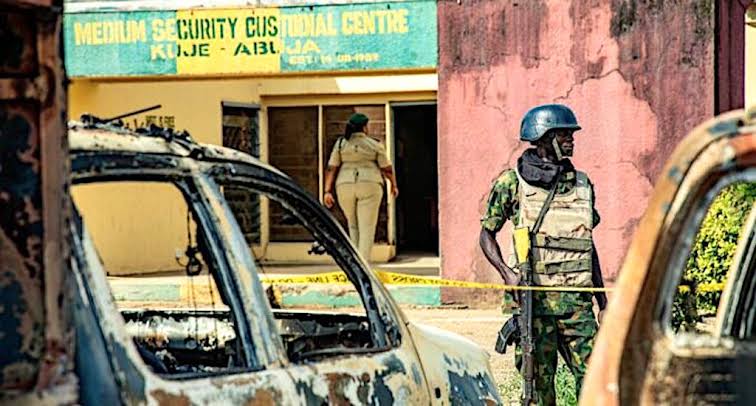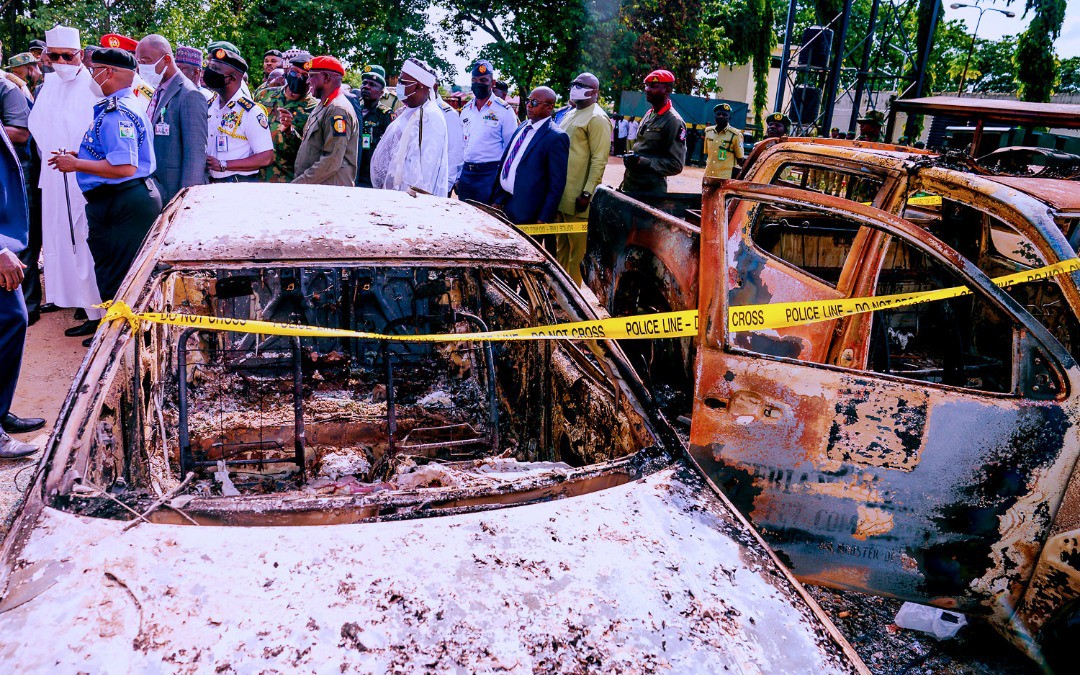Editorial
Kuje prison attack: A shame of the nation

The Kuje prison attack of July 5, 2023 masterminded by suspected Boko Haram insurgents is yet another low point in our security architecture, and disturbing affirmation of our vulnerability to further attacks.
Under Gen. Buhari’s presidency, our security system has snapped and fatally wounded at its seams: kidnappings are order of the day, banditry and near anarchy have become an open sore, while life has become nasty, short and brutish.
It would seem the current administration has outsourced not only governance to vague third party influencers widely seen as cabal by some Nigerians; but much of our security has been rented out as franchises to various armed groups called bandits who have carved out their own sphere of influence and operation by armed criminal warlords in parts of northern Nigeria, especially northwest and North Central.
These non state actors and their cousins – the Islamic insurgents are widely believed to be behind the Kuje prison jail break in which about 69 Boko Haram inmates were given their freedom. A day before the assault on Kuje, the advance guard of presidential convoy to Daura was attacked by bandits, a development which again, highlighted the growing audacity and confidence of the bandits.
Business Hallmark like many Nigerians and groups is deeply concerned as the Buhari administration’s stock response to every attack suggests open disregard for the lives of ordinary Nigerians and national security.
The usual jejune mantra: “we are on top of the situation”, “we will not allow enemies of the country to take over” is no longer enough to assuage the wounded feelings of the citizens who watch in helplessness and panic as the security architecture buckles and is overwhelmed by, what it would seem, superior firepower of the bandits.
The Kuje prison jail break was not the first; in the last two years, there had been similar attacks in Kabba, Koton Karfe all in Kogi State, Minna in Niger State and Ogbomosho in Oyo State, Owerri in Imo state, to mention but a few. More concerning is the inability of the federal government to prevent further attacks.
After each assault, investigations are routinely carried out, no one has seen the results, and it is the considered view of this newspaper that the investigation into the Kuje embarrassment may not be an exception.
Nothing demonstrates the helplessness of the federal government than the shameful statement credited to the Police Affairs Minister, Mohammed Dingyadi to the effect that the terrorists who attacked the Correctional Centre, Kuje in the Federal Capital Territory (FCT) succeeded because they had superior fire power and came in large number.
This self immolation statement was made while briefing State House correspondents on the outcome of the National Security Council meeting presided over by President Muhammadu Buhari at the Presidential Villa, Abuja.
The Minister said the security personnel deployed to the facility did their best to repel the attack but were subdued by the superior weaponry of the terrorists. When we contextualize the Police Affairs Minister’s statement, we are immediately confronted with nightmarish fear for our country where accountability has receded into a backseat.
Huge sums of funds are allocated to the armed forces yearly without any commensurate results in war theatres, yet media reports of lavish lifestyles and opulence of military generals are never investigated.
Investigations in the terrorist attack at the Kuje Medium Security Custodial Centre have continued as the Nigerian Army has detained the soldiers on duty on that fateful day for questioning.
The military, the intelligence services and the Nigerian Correctional Services have been under pressure because of the security failures to prevent the attack and/or repel the terrorists when they launched.
Recently, concerned Nigerians have wondered what has become of intelligence in the armed forces, the DSS and the police? This has become worrisome.
This is just as sources have revealed the constraints prison authorities face in the administration of custodial facilities across the country. The Controller General of the NCoS is said to be mostly in the dark regarding intelligence updates and getting access to the president.
An angry President Buhari had expressed disappointment with the collapsed intelligence in the Medium Security Custodial Centre, Kuje, saying, “I am disappointed with the intelligence system. How can terrorists organise, have weapons, attack a security installation and get away with it?”
President Buhari, who, like most Nigerians, was shocked by both the scale and audacity of the attack queried: “How did the defences at the prison fail to prevent the attack? How many inmates were in the facility?”
But for us at Business Hallmark, the presidential vituperation is akin to self blame. The Kuje incident is not the first. But as characteristic of his nature, Mr. Buhari tends to be laid back in even the most serious of development in the affairs of the country that normally would call for action.
Business Hallmark is worried by allegations making the rounds that the military authorities withdrew soldiers guarding the facility 24 hours before the attack. Observers have also alleged internal compromise and called for an investigation.
More worrisome is another report on social and mainstream media that investigation has shown that the security personnel on duty that day did not put up any resistance when the terrorists struck, and that the only bullet shells found in the prison premises were those fired by the invaders – meaning that the military, police, DSS, Civil Defence and armed prison guards did not fight the invaders.
It would seem the usual dysfunction in our system may have been responsible for attacks on our prison facilities and the growing banditry, and the accompanying lawlessness.
We call for a comprehensive overhaul of the entire security architecture, and a national security summit be convened by the federal government where all stakeholders will be made to give an input on how to solve the current security challenge.
Business Hallmark also calls for a more robust synergy among the security arms and the military. The current dysfunction is an aberration.
Security agencies should not see themselves in competition but as complementary. This will foster the sharing of intelligence.





